Tablas de Daimiel: Galería multimedia
Tablas de Daimiel: Galería multimedia
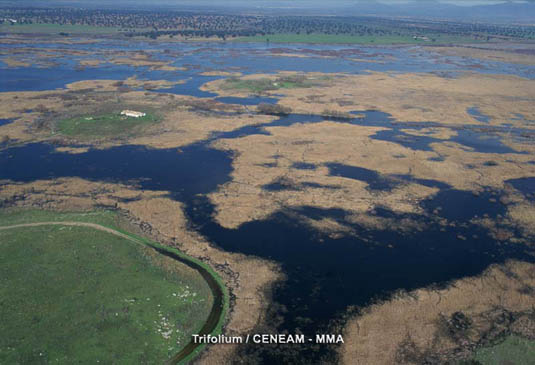 Las Tablas de Daimiel se forman en la llanura de inundación que generan los ríos Guadiana y Cigüela en su confluencia.
Las Tablas de Daimiel se forman en la llanura de inundación que generan los ríos Guadiana y Cigüela en su confluencia.
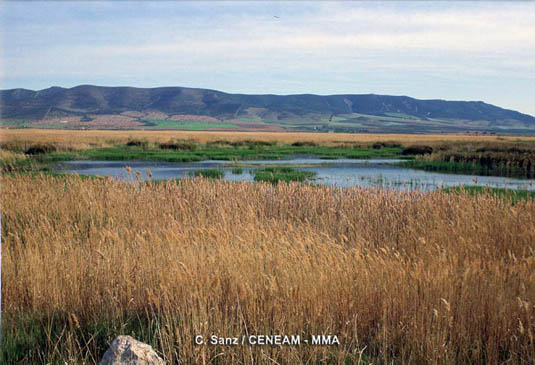 El Parque Nacional de las Tablas de Daimiel es el principal representante de las zonas húmedas interiores peninsulares.
El Parque Nacional de las Tablas de Daimiel es el principal representante de las zonas húmedas interiores peninsulares.
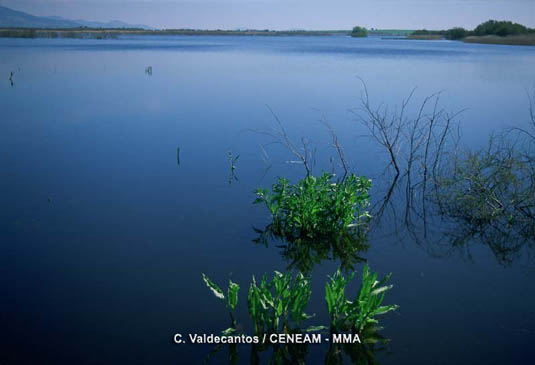 El agua es el recurso indispensable para el mantenimiento de la vida en el parque.
El agua es el recurso indispensable para el mantenimiento de la vida en el parque.
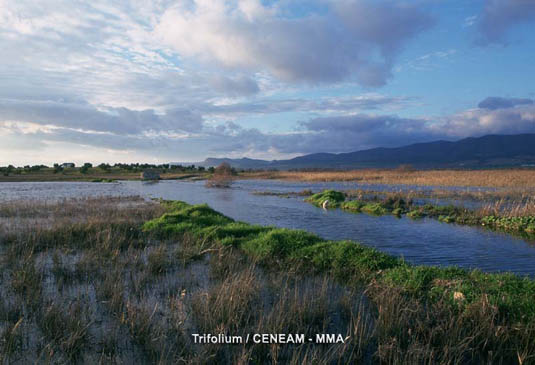 Las tablas de Daimiel, son uno de los mejores ejemplos de nuestro país de llanuras inundadas asociadas a ríos.
Las tablas de Daimiel, son uno de los mejores ejemplos de nuestro país de llanuras inundadas asociadas a ríos.
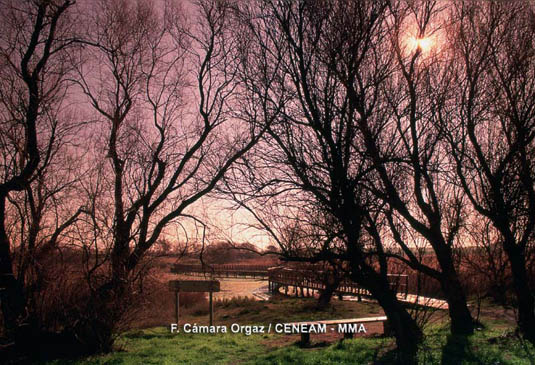 Los tarajes (Tamarix canariensis) viven en zonas húmedas y toleran un cierto grado de salinidad.
Los tarajes (Tamarix canariensis) viven en zonas húmedas y toleran un cierto grado de salinidad.
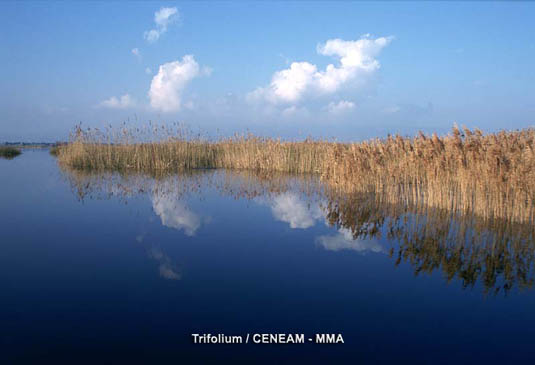 Los carrizos (Phragmites communis) crecen en aguas poco profundas formando grupos cerrados casi impenetrables.
Los carrizos (Phragmites communis) crecen en aguas poco profundas formando grupos cerrados casi impenetrables.
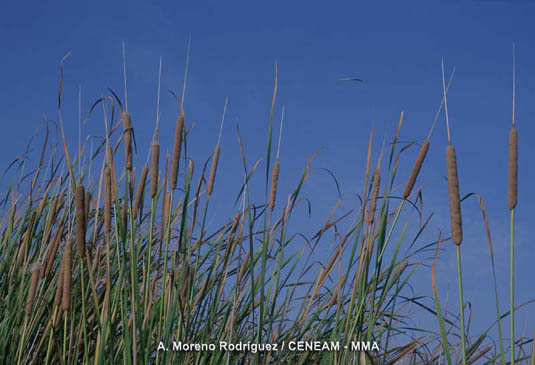 Las eneas (Typha latifolia) ocupan las zonas más profundas de las Tablas. Sus hojas largas y aplanadas tienen los bordes cortantes.
Las eneas (Typha latifolia) ocupan las zonas más profundas de las Tablas. Sus hojas largas y aplanadas tienen los bordes cortantes.
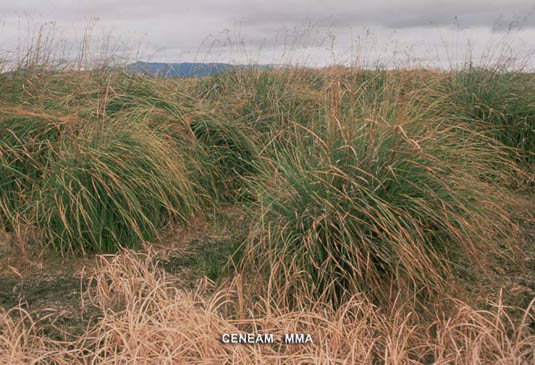 En Daimiel encontramos el masegar (Cladium mariscus) más extenso de Europa occidental, aunque ultimamente está sufriendo una regresión por el acortamiento de los períodos de innudación.
En Daimiel encontramos el masegar (Cladium mariscus) más extenso de Europa occidental, aunque ultimamente está sufriendo una regresión por el acortamiento de los períodos de innudación.
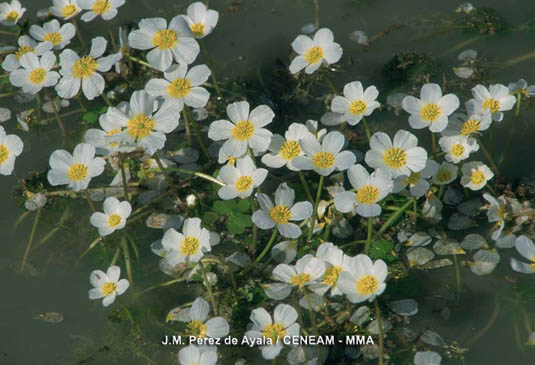 La manzanilla de agua (Ranunculus peltatus), forma alfombras flotantes en las caños y en los arroyos del parque.
La manzanilla de agua (Ranunculus peltatus), forma alfombras flotantes en las caños y en los arroyos del parque.
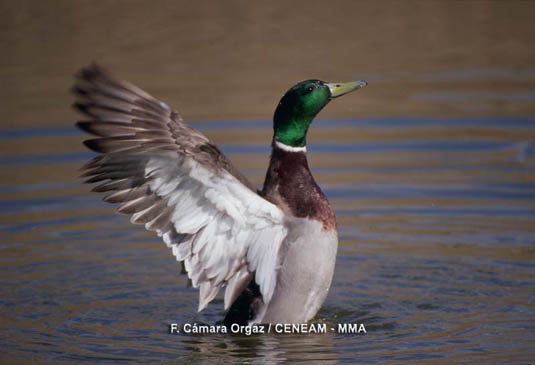 El Anade azulon (Anas platyrhynchos) es el pato más común en Daimiel. Es el antecesor de los patos domésticos.
El Anade azulon (Anas platyrhynchos) es el pato más común en Daimiel. Es el antecesor de los patos domésticos.
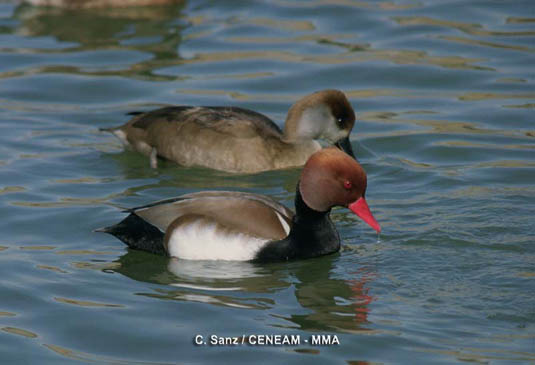 El pato colorado (Netta rufina) es un ave arisca y desconfiada, típica de aguas abiertas y relativamente profundas.
El pato colorado (Netta rufina) es un ave arisca y desconfiada, típica de aguas abiertas y relativamente profundas.
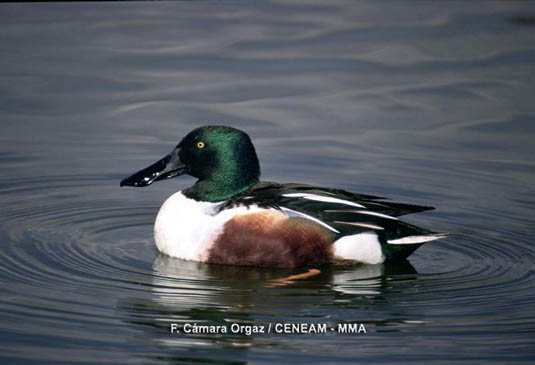 El cuchara común (Anas clypeata), es un ave invernante que llega al parque a principios del otoño. Se le denomina cuchara por tener un pico ancho y aplanado.
El cuchara común (Anas clypeata), es un ave invernante que llega al parque a principios del otoño. Se le denomina cuchara por tener un pico ancho y aplanado.
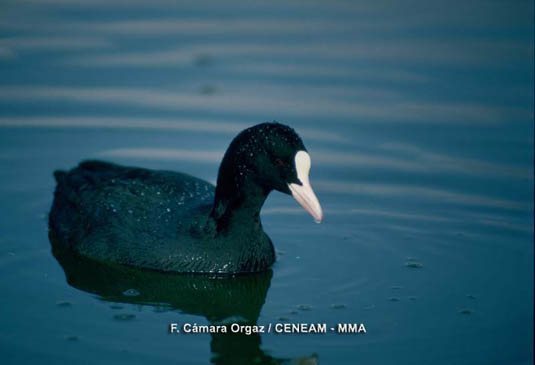 La focha común (Fulica atra), está presente durante todo el año en las Tablas de Daimiel.
La focha común (Fulica atra), está presente durante todo el año en las Tablas de Daimiel.
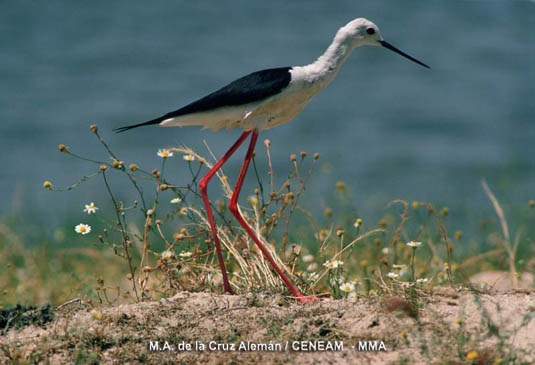 La cigüeñuela (Himantopus himantopus), es un ave abundante en las tablas. Cría formando amplias colonias con bastante separación entre los nidos.
La cigüeñuela (Himantopus himantopus), es un ave abundante en las tablas. Cría formando amplias colonias con bastante separación entre los nidos.
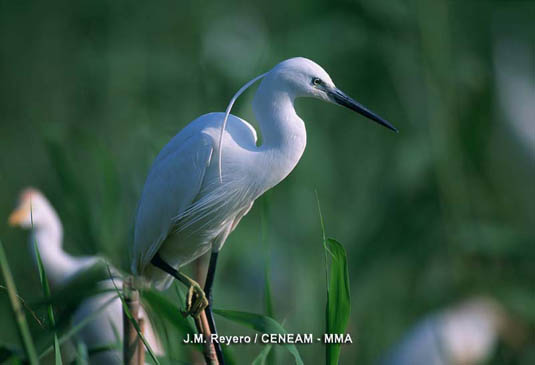 La garceta comun (Egretta garzetta) presenta una largas plumas blancas en la nuca durante el período nupcial.
La garceta comun (Egretta garzetta) presenta una largas plumas blancas en la nuca durante el período nupcial.
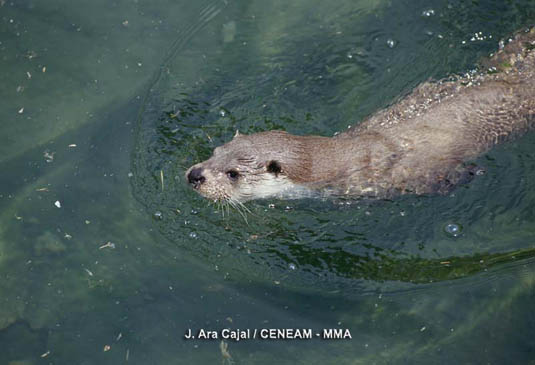 La nutria (Lutra lutra), es un animal relativamente común en el parque nacional. En invierno se alimenta de peces y en verano de cangrejos
La nutria (Lutra lutra), es un animal relativamente común en el parque nacional. En invierno se alimenta de peces y en verano de cangrejos
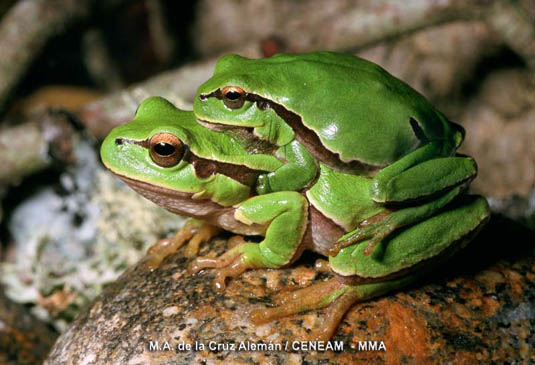 La ranita de San antonio (Hyla arborea), es un anfibio de hábitos nocturnos, que puede trepar por los tallos de las plantas gracias a los discos adhesivos que tiene en sus dedos.
La ranita de San antonio (Hyla arborea), es un anfibio de hábitos nocturnos, que puede trepar por los tallos de las plantas gracias a los discos adhesivos que tiene en sus dedos.
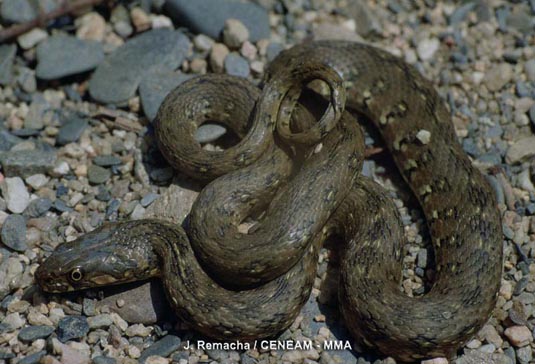 La culebra viperina (Natrix maura) es un reptil acuático que cuando se ve amenazado silba, aplana el cuerpo y la cabeza recordando a una víbora, de ahí le viene su nombre común.
La culebra viperina (Natrix maura) es un reptil acuático que cuando se ve amenazado silba, aplana el cuerpo y la cabeza recordando a una víbora, de ahí le viene su nombre común.
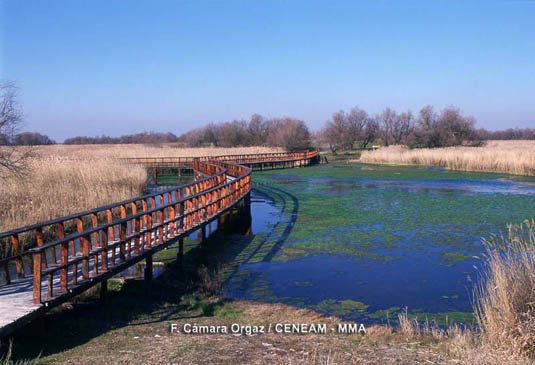 Para poder atravesar las tablas de agua, en algunas zonas del parque, hay un entramado de pasarelas de madera que permite moverse de un lado a otro .
Para poder atravesar las tablas de agua, en algunas zonas del parque, hay un entramado de pasarelas de madera que permite moverse de un lado a otro .
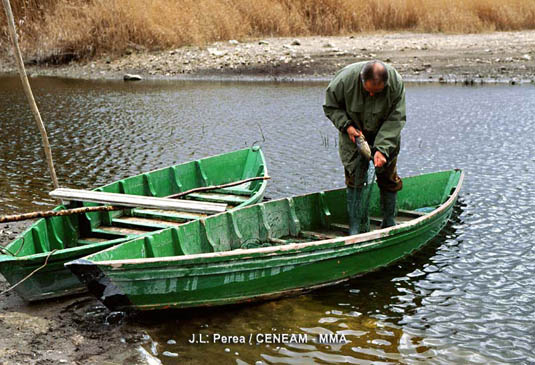 Uno de los aprovechamientos que tradicionalmente se realizaba en este lugar era la pesca. Actualmente ya no se lleva a cabo.
Uno de los aprovechamientos que tradicionalmente se realizaba en este lugar era la pesca. Actualmente ya no se lleva a cabo.
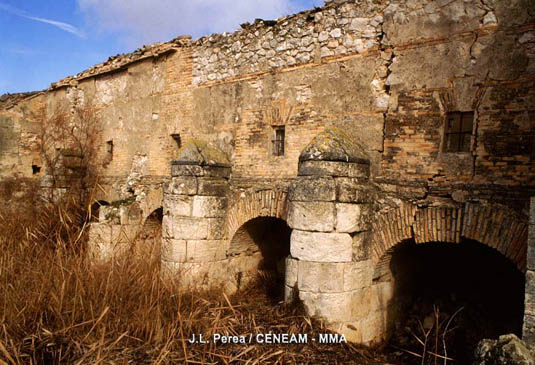 Antiguamente había varios molinos de agua en funcionamiento en la ribera del río Guadiana, hoy solo quedan vestigios de algunos de ellos como los del molino molemocho.
Antiguamente había varios molinos de agua en funcionamiento en la ribera del río Guadiana, hoy solo quedan vestigios de algunos de ellos como los del molino molemocho.
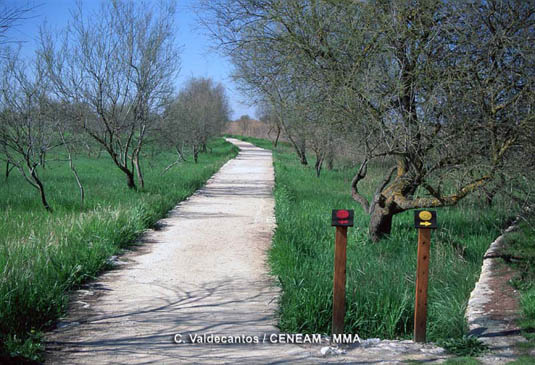 El parque cuenta con una serie de senderos señalizados que permiten conocer a fondo sus diferentes ecosistemas.
El parque cuenta con una serie de senderos señalizados que permiten conocer a fondo sus diferentes ecosistemas.
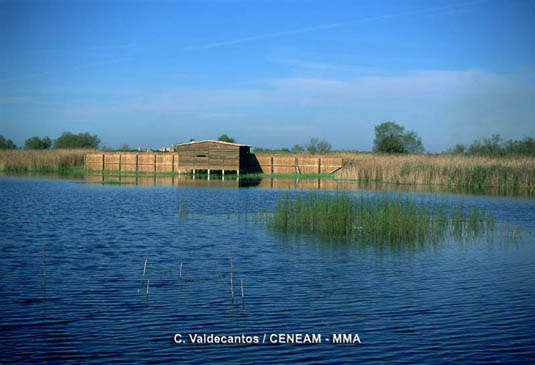 En las Tablas de Daimiel, hay varios observatorios, para facilitar a los visitanes la contemplación de las aves.
En las Tablas de Daimiel, hay varios observatorios, para facilitar a los visitanes la contemplación de las aves.
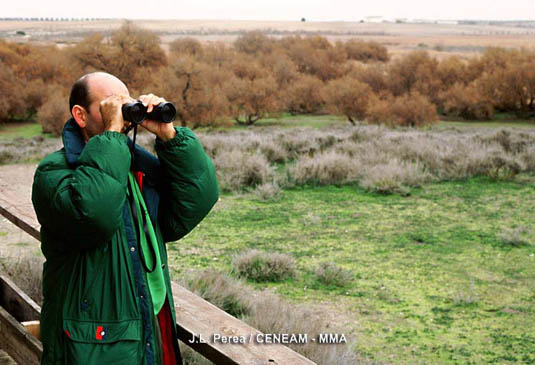 El parque nacional, es un lugar privilegiado para los amantes de la ornitología.
El parque nacional, es un lugar privilegiado para los amantes de la ornitología.
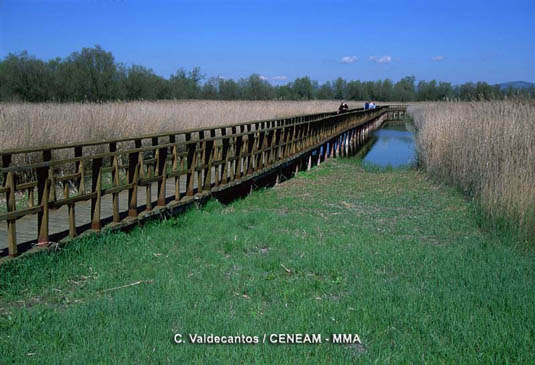 La mejor época para visitar el parque nacional, es entre finales de septiembre y mediados de mayo.
La mejor época para visitar el parque nacional, es entre finales de septiembre y mediados de mayo.
This page provides information on cookies we use: We use our own and third-party cookies to keep your session active, personalise your experience, and collect anonymous statistics about how you use this website. You can choose to accept all cookies or select which types you'd like to allow. To learn more about the cookies we use, read our Cookies Policy.
We use two types of cookies on this site. First, there are Functional Cookies, which are essential for the website to work properly. They store session data to make your experience smoother and more convenient. On the other hand, Analytical Cookies collect information about how you use the portal, without personal data, helping us provide a better and more tailored service.
Introduction to the Use of Cookies on the MITECO.gob.es Website
Cookies are small files that are stored on your device when you visit a webpage. They are essential tools that help provide many of the services available on the information society. Among other things, cookies allow a webpage to store and retrieve information about a user's browsing habits or their device. Based on this information, they can be used to recognise the user and enhance the service provided.
Types of Cookies
Depending on the entity that manages the domain from which the cookies are sent and processes the data, there are two types of cookies: first-party cookies and third-party cookies.
There is also a second classification based on how long the cookies remain stored in the user's browser: session cookies and persistent cookies.
Finally, cookies can also be classified into five types based on the purpose for which the data is processed: technical cookies, personalisation cookies, analytics cookies, advertising cookies, and behavioural advertising cookies.
For more information on this, you can refer to the Guide on the use of cookies from the Spanish Data Protection Agency.
Cookies used on the website
The web portal of the Ministry for Ecological Transition and the Demographic Challenge uses Adobe Analytics, an analytics tool that helps website and application owners understand how visitors interact with their content. Adobe Analytics uses a small number of cookies to collect data and generate usage statistics for websites. This information is sent anonymously and is not shared with third parties under any circumstances. You can choose to accept or reject these cookies, as they do not affect the portal’s functionality. However, they help provide valuable information that allows us to offer a better and more tailored service. For more information about Adobe Analytics cookies and privacy, please refer to the following links:
Additionally, pages featuring content from social network X will only set cookies if the user is logged into the X site. For more details on these cookies, please refer to the following link: Privacy on Social Network X
Finally, a technical cookie named MITECO-compliance is stored, which is a first-party, technical, and session-based cookie. It manages user consent for the use of cookies on the website, remembering which users have accepted them and which have not, ensuring that those who have accepted are not shown cookie consent messages at the top of the page. This cookie is essential for the proper functioning of the portal.
Cookies Policy Acceptance / Rejection
The Ministry for Ecological Transition and the Demographic Challenge gives you the option to accept or reject cookies that are not essential for the portal's operation. Upon accessing the portal, a message will be displayed in the centre of the page with information about the cookie policy and the following options:
· Firefox
· Chrome
· Safari